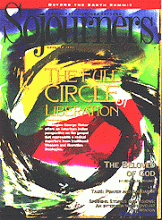I've never cared much for coffee-table books; they are usually overpriced, over-photographed, and under-utilized. And unless you like fluffy travel writing, chances are they won't appeal to you.
Rescuers: Portraits of Moral Courage in the Holocaust (Holmes and Meier, 1992, $29.95, paper), by Gay Block and Malka Drucker, looks like a coffee-table book: It is big, full of stunning and alluring portrait photographs, and sports a cover that beckons you to pick it up from the table. But there is no fluff in this book; it explores islands of human goodness in a sea of human failure. Supported by the Jewish Foundation for Christian Rescuers, Malka Drucker and Gay Block traveled across the globe to interview 105 rescuers from 11 different countries. The fruit of their travels has resulted in this book, a film, and a traveling exhibit of the photographic portraits of the rescuers.
Rabbi Harold Schulweis of the foundation sums up the project's rationale in his afterword: "The rescuers teach us to stand with the threatened. They confirm with their bodies our conviction that there were and always are alternatives to passive complicity to evil. We who remember the sinister face of the torturers will not forget the benign countenance of goodness."
The authors have wisely allowed the rescuers to tell their stories in their own words. Their accounts are powerful in their simplicity. Some of the interviews appear to be cathartic for those sharing. As the Dutch rescuer Semmy Riekerk said in conclusion: "I've told you things I've never told others before."
Read the Full Article

